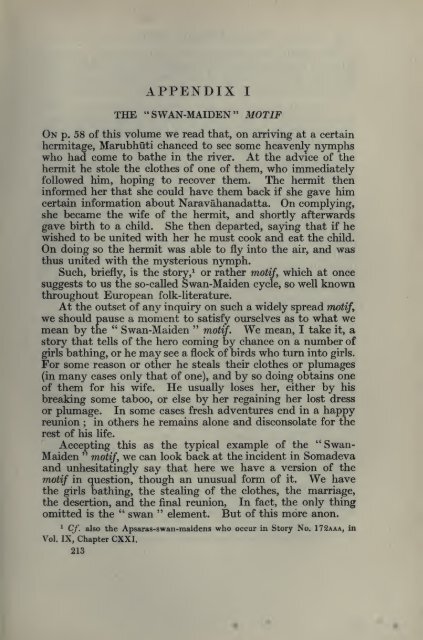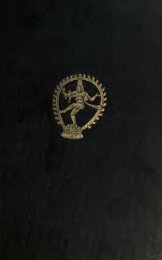- Page 3:
m 11 M mm m
- Page 7 and 8:
LSansK THE OCEAN OF STORY BEING G.
- Page 9 and 10:
IT FOREWORD is a high honour but al
- Page 11 and 12:
FOREWORD vii not equally absurd to
- Page 13 and 14:
FOREWORD ix though we may differ as
- Page 15 and 16:
FOREWORD xi Indeed the question " w
- Page 17 and 18:
FOREWORD xiii the head of an asceti
- Page 19 and 20:
FOREWORD xv But, when all is said a
- Page 21 and 22:
FOREWORD xvii attributed to a natur
- Page 23 and 24:
or Gypsy 1 ; FOREWORD xix and what
- Page 25 and 26:
FOREWORD xxi forms may the results
- Page 27 and 28:
FOREWORD xxiii Another good reason
- Page 29 and 30:
FOREWORD xxv reasons it does not fo
- Page 31 and 32:
FOREWORD xxvii Mr Penzer as his mod
- Page 33 and 34:
FOREWORD xxix need not be very elab
- Page 35 and 36:
CONTENTS BOOK XIII: MADIRAVATI Auth
- Page 37 and 38:
CONTENTS xxxiii CHAPTER CXII contin
- Page 39:
CONTENTS xxxv APPENDIX II PAGE The
- Page 43:
THE OCEAN OF STORY
- Page 46 and 47:
2 THE OCEAN OF STORY region, being,
- Page 48 and 49:
4 THE OCEAN OF STORY for you, she w
- Page 50 and 51:
6 THE OCEAN OF STORY roaming about
- Page 52 and 53:
8 THE OCEAN OF STORY " ' There I sa
- Page 54 and 55:
10 THE OCEAN OF STORY neighbours, o
- Page 56 and 57:
12 THE OCEAN OF STORY " She immedia
- Page 58 and 59:
14 THE OCEAN OF STORY of joy, and I
- Page 60 and 61:
16 THE OCEAN OF STORY Hereafter I w
- Page 62 and 63:
18 THE OCEAN OF STORY NOTE 1. THE U
- Page 64 and 65:
20 THE OCEAN OF STORY sun's norther
- Page 66 and 67:
22 THE OCEAN OF STORY by violent gr
- Page 68 and 69:
24 THE OCEAN OF STORY But, however
- Page 70 and 71:
26 THE OCEAN OF STORY from my fathe
- Page 72 and 73:
CHAPTER CVI THEN a certain Gandharv
- Page 74 and 75:
30 THE OCEAN OF STORY must be a hai
- Page 76 and 77:
32 THE OCEAN OF STORY raining joy i
- Page 78 and 79:
34 THE OCEAN OF STORY visit my frie
- Page 80 and 81:
36 THE OCEAN OF STORY [M] " So if I
- Page 82 and 83:
38 THE OCEAN OF STORY form, with dr
- Page 84 and 85:
40 THE OCEAN OF STORY another argum
- Page 86 and 87:
42 THE OCEAN OF STORY court cleft a
- Page 88 and 89:
44 THE OCEAN OF STORY 166. Story of
- Page 90 and 91:
46 THE OCEAN OF STORY said this, sh
- Page 92 and 93:
48 THE OCEAN OF STORY you to conque
- Page 94 and 95:
50 THE OCEAN OF STORY So I will to-
- Page 96 and 97:
52 THE OCEAN OF STORY shalt have pr
- Page 98 and 99:
54 THE OCEAN OF STORY " When I was
- Page 100 and 101:
56 THE OCEAN OF STORY my destinatio
- Page 102 and 103:
58 THE OCEAN OF STORY " When I was
- Page 104 and 105:
60 THE OCEAN OF STORY and, thanks t
- Page 106 and 107:
62 THE OCEAN OF STORY When the batt
- Page 108 and 109:
64 THE OCEAN OF STORY say again and
- Page 110 and 111:
66 THE OCEAN OF STORY lovingly ente
- Page 112 and 113:
68 THE OCEAN OF STORY Naravahanadat
- Page 114 and 115:
INVOCATION BOOK XV: MAHABHISHEKA CH
- Page 116 and 117:
72 THE OCEAN OF STORY Then the herm
- Page 118 and 119:
74 THE OCEAN OF STORY a battle betw
- Page 120 and 121:
76 THE OCEAN OF STORY of Mahamaya,
- Page 122 and 123:
78 THE OCEAN OF STORY by the sacrif
- Page 124 and 125:
80 THE OCEAN OF STORY Then Mandarad
- Page 126 and 127:
THEN, CHAPTER CX the next day, the
- Page 128 and 129:
84 THE OCEAN OF STORY him and said
- Page 130 and 131:
86 THE OCEAN OF STORY that seemed t
- Page 132 and 133:
88 THE OCEAN OF STORY valour, he ap
- Page 134 and 135:
90 THE OCEAN OF STORY when he was b
- Page 136 and 137:
92 THE OCEAN OF STORY the magic pow
- Page 138 and 139:
BOOK XVI : SURATAMANJARI INVOCATION
- Page 140 and 141:
96 THE OCEAN OF STORY with cardamom
- Page 142 and 143:
98 THE OCEAN OF STORY dependent on
- Page 144 and 145:
100 THE OCEAN OF STORY female towar
- Page 146 and 147:
102 THE OCEAN OF STORY the minister
- Page 148 and 149:
104 THE OCEAN OF STORY In the midst
- Page 150 and 151:
106 THE OCEAN OF STORY him I was ma
- Page 152 and 153:
108 THE OCEAN OF STORY eats the hea
- Page 154 and 155:
110 THE OCEAN OF STORY protects." T
- Page 156 and 157:
112 THE OCEAN OF STORY companions :
- Page 158 and 159:
114 THE OCEAN OF STORY So thou art
- Page 160 and 161:
116 THE OCEAN OF STORY thought that
- Page 162 and 163:
118 THE OCEAN OF STORY 168. Story o
- Page 164 and 165:
120 THE OCEAN OF STORY the king, in
- Page 166 and 167:
122 THE OCEAN OF STORY them. Howeve
- Page 168 and 169:
CHAPTER CXIII WHEN Naravahanadatta,
- Page 170 and 171:
126 THE OCEAN OF STORY like the ful
- Page 172 and 173:
128 THE OCEAN OF STORY city, accomp
- Page 174 and 175:
130 THE OCEAN OF STORY In the meanw
- Page 176 and 177:
INVOCATION GLORY BOOK XVII: PADMAVA
- Page 178 and 179:
134 THE OCEAN OF STORY Somaprabha,
- Page 180 and 181:
136 THE OCEAN OF STORY and remained
- Page 182 and 183:
138 THE OCEAN OF STORY time meet to
- Page 184 and 185:
140 THE OCEAN OF STORY other. Terri
- Page 186 and 187:
142 THE OCEAN OF STORY and in order
- Page 188 and 189:
CHAPTER CXV 170. Story of King Brah
- Page 190 and 191:
146 THE OCEAN OF STORY Vidyadharas,
- Page 192 and 193:
148 THE OCEAN OF STORY broke his fa
- Page 194 and 195:
150 THE OCEAN OF STORY At this poin
- Page 196 and 197:
152 THE OCEAN OF STORY done, he alo
- Page 198 and 199:
154 THE OCEAN OF STORY of the Gandh
- Page 200 and 201:
THEN CHAPTER CXVI 170b. Muktaphalak
- Page 202 and 203:
158 THE OCEAN OF STORY of mine has
- Page 204 and 205:
160 THE OCEAN OF STORY delighted th
- Page 206 and 207: 162 THE OCEAN OF STORY the gods. An
- Page 208 and 209: IN CHAPTER CXVII 170b. Muktdphalake
- Page 210 and 211: 166 THE OCEAN OF STORY Manoharika,
- Page 212 and 213: 168 THE OCEAN OF STORY her round by
- Page 214 and 215: 170 THE OCEAN OF STORY peculiarity,
- Page 216 and 217: 172 THE OCEAN OF STORY have to-day
- Page 218 and 219: 174 THE OCEAN OF STORY " My beloved
- Page 220 and 221: 176 THE OCEAN OF STORY command, and
- Page 222 and 223: WHILE CHAPTER CXVIII 170b. Muktdpha
- Page 224 and 225: 180 THE OCEAN OF STORY gave him the
- Page 226 and 227: 182 THE OCEAN OF STORY preparation
- Page 228 and 229: 184 THE OCEAN OF STORY of Pasupati
- Page 230 and 231: 186 THE OCEAN OF STORY go to their
- Page 232 and 233: 188 THE OCEAN OF STORY and fall at
- Page 234 and 235: 190 THE OCEAN OF STORY treasure-hou
- Page 236 and 237: 192 THE OCEAN OF STORY deeply in lo
- Page 238 and 239: 194 THE OCEAN OF STORY some days Sv
- Page 240 and 241: 196 THE OCEAN OF STORY Having said
- Page 242 and 243: 198 THE OCEAN OF STORY will remain
- Page 244 and 245: 200 THE OCEAN OF STORY beloved. Obs
- Page 246 and 247: 202 THE OCEAN OF STORY seem to tall
- Page 248 and 249: 204 THE OCEAN OF STORY Prince Mukta
- Page 250 and 251: 206 THE OCEAN OF STORY female heart
- Page 252 and 253: 208 THE OCEAN OF STORY thy sake aba
- Page 255: APPENDIX I
- Page 259 and 260: APPENDIX I THE "SWAN-MAIDEN" MOTIF
- Page 261 and 262: APPENDIX I THE "SWAN-MAIDEN" MOTIF
- Page 263 and 264: APPENDIX I THE "SWAN-MAIDEN" MOTIF
- Page 265 and 266: APPENDIX I THE "SWAN-MAIDEN" MOTIF
- Page 267 and 268: APPENDIX I THE "SWAN-MAIDEN" MOTIF
- Page 269 and 270: APPENDIX I THE "SWAN-MAIDEN" MOTIF
- Page 271 and 272: APPENDIX I THE "SWAN-MAIDEN" MOTIF
- Page 273 and 274: APPENDIX I THE "SWAN-MAIDEN" MOTIF
- Page 275 and 276: APPENDIX I "THE SWAN-MAIDEN" MOTIF
- Page 277 and 278: APPENDIX I THE "SWAN-MAIDEN" MOTIF
- Page 279: APPENDIX II
- Page 282 and 283: 238 THE OCEAN OF STORY only his con
- Page 284 and 285: 240 THE OCEAN OF STORY Garcia da Or
- Page 286 and 287: 242 THE OCEAN OF STORY the Moors an
- Page 288 and 289: 244 THE OCEAN OF STORY besides what
- Page 290 and 291: 246 THE OCEAN OF STORY The Five Fru
- Page 292 and 293: 248 THE OCEAN OF STORY Thus, I do n
- Page 294 and 295: 250 THE OCEAN OF STORY various tray
- Page 296 and 297: 252 THE OCEAN OF STORY sometimes ma
- Page 298 and 299: 254 THE OCEAN OF STORY rudely carve
- Page 300 and 301: 256 THE OCEAN OF STORY same time ha
- Page 302 and 303: 258 THE OCEAN OF STORY otherwise ca
- Page 304 and 305: 260 THE OCEAN OF STORY it is so muc
- Page 306 and 307:
262 THE OCEAN OF STORY chalke, and
- Page 308 and 309:
264 THE OCEAN OF STORY better to un
- Page 310 and 311:
266 THE OCEAN OF STORY which name i
- Page 312 and 313:
268 THE OCEAN OF STORY Little did t
- Page 314 and 315:
270 THE OCEAN OF STORY and melancho
- Page 316 and 317:
272 THE OCEAN OF STORY acutangula)
- Page 318 and 319:
274 THE OCEAN OF STORY The Bara'is
- Page 320 and 321:
276 THE OCEAN OF STORY clearly indi
- Page 322 and 323:
278 THE OCEAN OF STORY pregnancy is
- Page 324 and 325:
280 THE OCEAN OF STORY When the bal
- Page 326 and 327:
282 THE OCEAN OF STORY concerned. T
- Page 328 and 329:
284 THE OCEAN OF STORY Assam, Burma
- Page 330 and 331:
286 THE OCEAN OF STORY and so the N
- Page 332 and 333:
288 THE OCEAN OF STORY The areca-pa
- Page 334 and 335:
290 THE OCEAN OF STORY Semang tribe
- Page 336 and 337:
292 THE OCEAN OF STORY Some further
- Page 338 and 339:
294 THE OCEAN OF STORY ripe areca-n
- Page 340 and 341:
296 THE OCEAN OF STORY p. 1001) say
- Page 342 and 343:
298 THE OCEAN OF STORY When this is
- Page 344 and 345:
300 THE OCEAN OF STORY as we saw wa
- Page 346 and 347:
302 THE OCEAN OF STORY Readers will
- Page 348 and 349:
304 THE OCEAN OF STORY the effect o
- Page 350 and 351:
306 THE OCEAN OF STORY thirtieth ye
- Page 352 and 353:
308 THE OCEAN OF STORY varieties of
- Page 354 and 355:
310 THE OCEAN OF STORY To such an e
- Page 356 and 357:
312 THE OCEAN OF STORY or even desi
- Page 358 and 359:
314 THE OCEAN OF STORY on the Fly.
- Page 360 and 361:
316 THE OCEAN OF STORY Straits gour
- Page 362 and 363:
318 THE OCEAN OF STORY further spre
- Page 365 and 366:
INDEX I SANSKRIT WORDS AND PROPER N
- Page 367 and 368:
Bowrey, Thomas (1669-1679), account
- Page 369 and 370:
Dlrghadamshtra, father of Sruta, 84
- Page 371 and 372:
Hose, C, Natural Man, Ldn., 1926, 2
- Page 373 and 374:
Madanamanchuka, head queen of Narav
- Page 375 and 376:
Paludanus (Bernard ten Broecke), in
- Page 377 and 378:
Savitrl and Angiras, Story of, 22-2
- Page 379 and 380:
Tille, V., Verzeichnis der Bohmisch
- Page 381 and 382:
Abduction of Suratamanjari, the, 10
- Page 383 and 384:
Bath of purification, the annual, 1
- Page 385 and 386:
Castes of Bengal, The Tribes and, H
- Page 387 and 388:
Days, dreams fulfilled within ten,
- Page 389 and 390:
Expression of "betel-nut," incorrec
- Page 391 and 392:
Growers, betel-vine, caste of, 270,
- Page 393 and 394:
Journal of the Anthropological Soci
- Page 395 and 396:
Marriage continued 280, 281; ceremo
- Page 397 and 398:
Ordeal (Hindu)," A. B. Keith, Hasti
- Page 399 and 400:
Report, Annual, British New Guinea,
- Page 401 and 402:
Son Avt Son Avantivardhana, Story o
- Page 403 and 404:
irough New Guinea and the Cannibal
- Page 405 and 406:
Water-spirit, betel " chew " offere
- Page 410 and 411:
;&**.






